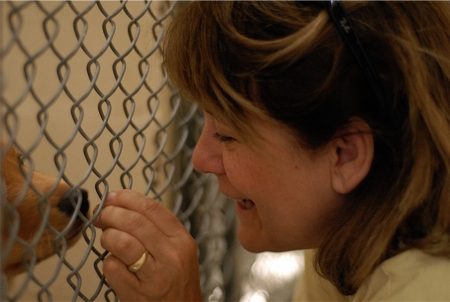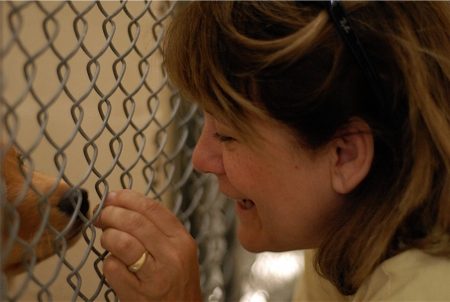

A bone for the dogs behind the green door
Most open-admission animal shelters house a population segment that the public never sees — the custody dogs being confined by court order.
Seized as a result of cruelty or neglect cases, or dog aggression, they aren’t up for adoption. Dependent on a judge’s decree, they languish in kennels under court order without the benefit of human interaction or even the opportunity to breathe fresh air and put their paws in the grass.
A few months ago, I visited with Corinne Dowling, the founder of Give a Dog a Bone. She was a volunteer dog walker at San Francisco’s Animal Care and Control (ACC) when her interest grew piqued by “the dogs behind the green door.” Canine residents in custody might include dogs from pit bull fighting rings, those enmeshed in dog bite cases, or dogs with owners who have been hospitalized for physical or mental illness.
Destined to remain in isolation for months, even up to a year, they are bored and stressed while they wait for their cases to be resolved in the court system. Many face imminent death when their time is up.
“These are the forgotten dogs that nobody knows about,” Dowling says. “I found out they were here for incredible lengths of time with nothing. Protective custody is actually solitary confinement.”
Dowling’s heart went out to them, and with the support of ACC, she applied for a grant to start a quality of life program in 1999 called Give a Dog a Bone that can be administered from behind bars if necessary. Tug toys made of strong nylon rope, tennis balls on sticks, and a steady supply of stuffed animals and special food treats make life bearable for these dogs. Some animals receive supervised outdoor playtime. Dowling’s goal is to rebuild the dogs’ trust in human beings. Her program helps keeps the dogs socialized so they can be considered for adoption once their sentences have been served.
“We consider them victims, not perpetuators,” Dowling says. “In giving them quality of life, in loving them, through engaging their natural behaviors in a species-inappropriate environment, we are re-establishing the human-animal bond. Companionship is a fundamental part of what we do, because establishing a relationship with our dogs is the key to their road back to life as a companion animal in a good home.”
In 2007, the adoption rate for ACC’s custody dogs was 31 percent, the highest in the shelter’s history. Dowling aspires to bring her breakthrough program to animal shelters worldwide.
We all need to care about the dogs behind the green door. They have suffered at the hands of our species. Now we have an obligation to do right by them. These animals may not be seen, but as Dowling demonstrates, they shouldn’t be forgotten.
Join the newsletter and never miss out on dog content again!
"*" indicates required fields
By clicking the arrow, you agree to our web Terms of Use and Privacy & Cookie Policy. Easy unsubscribe links are provided in every email.